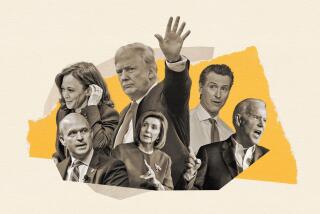Column: Slapping ‘Green’ in front of ‘New Deal’ is yet another sign of liberal intellectual exhaustion

It’s fitting that the Green New Deal pushed by many but popularized by Democratic phenom Rep. Alexandria Ocasio-Cortez, who had her “60 Minutes” debut on Sunday, is a triumph of recycling.
Not of plastic bags or soda cans, but of ideas. Specifically, FDR’s New Deal and the impulses behind it.
To her credit, Ocasio-Cortez (D-N.Y.) is fairly honest about her ideological recycling.
“None of these things are new ideas,” she explained on the campaign trail last October. “What we had was an existential threat in the context of a war. We had a direct existential threat with another nation; this time it was Nazi Germany, and the Axes [sic], who explicitly made the United States as an enemy, as an enemy.”
The New Deal itself was largely about war mobilization — without war.
“We chose to mobilize our entire economy and industrialized our entire economy, and we put hundreds of thousands, if not millions, of people to work in defending our shores and defending this country,” Ocasio-Cortez continued. “We have to do the same thing in order to get us to 100% renewable energy, and that’s just the truth of it.”
Alas, AOC, as many now call her, started the story in the middle. The need to prepare for war marked the end of the New Deal. As FDR put it, it was time for “Dr. New Deal” to be replaced by “Dr. Win the War.”
Ironically, the New Deal itself was largely about war mobilization — without war. Roosevelt campaigned for president promising to adapt Woodrow Wilson’s wartime industrial policies to fight the Great Depression.
Even before Roosevelt was elected, his aides investigated whether they could use the Trading with the Enemy Act for a gold embargo. In his inaugural address, he proclaimed, “I assume unhesitatingly the leadership of this great army of our people dedicated to the disciplined attack upon our common problems.”
Nearly the entire structure of the New Deal was copied from Wilson’s “war socialism.” The National Recovery Administration was modeled on the War Industries Board. The Reconstruction Finance Corporation was an update of Wilson’s War Finance Corporation.
The military buildup began not as a response to the Nazis, but as a jobs program. The Public Works Administration paid for the aircraft carriers Yorktown and Enterprise, as well as four cruisers, many smaller warships and over 100 army planes.
Even the workforce was militarized. On Sept. 13, 1933, stores in New York were ordered to close to honor the president’s NRA Day Parade, then the largest parade in the city’s history.
Nearly a quarter-million workers, organized by trade, marched past the president’s rostrum as 49 military planes flew overhead. Under the NRA, breaking discipline was a punishable offense, which is why a tailor, Jacob Maged, was sentenced to 30 days in jail for charging too little to press a suit.
Enter the Fray: First takes on the news of the minute from L.A. Times Opinion »
I could go on, but the important point is that ever since the philosopher William James coined the phrase the “moral equivalent of war,” American liberalism has been recycling the same basic idea: The country needs to be unified and organized as if we are at war, but not to fight a literal battle. The attraction lay in what John Dewey called “the social possibilities of war,” the ability to reorganize and unify society according to the schemes of planners and experts.
This was the through line of 20th century liberalism, and now 21st century liberalism, too. Wilson’s “war socialism,” FDR’s New Deal, Truman’s Fair Deal, JFK’s New Frontier, Johnson’s Great Society, Carter’s declaration that the energy crisis was a “moral equivalent of war,” and Barack Obama’s “New Foundation for growth,” with his Thomas Friedman-inspired talk about “Sputnik moments”: It’s the same idea gussied-up as something new.
Another irony: The militaristic organization of the domestic economy is a hallmark of nationalist movements. But nationalism is a dirty word among liberals today.
Instead, they name check a thoroughly nationalistic enterprise, the New Deal, and slap the word “Green” in front of it, as if it were a fresh coat of paint.
jgoldberg@latimescolumnists.com
Follow the Opinion section on Twitter @latimesopinion or Facebook.
More to Read
A cure for the common opinion
Get thought-provoking perspectives with our weekly newsletter.
You may occasionally receive promotional content from the Los Angeles Times.











